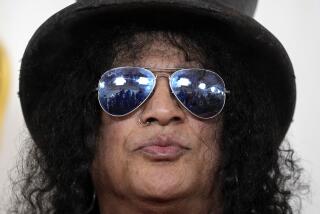MOTORHEAD GUITARIST IS RUNNING ON ALL CYLINDERS
- Share via
Wurzel Burston’s road to Motorhead qualifies as one of rock’s more implausible success stories.
Originally a drummer, Burston switched to guitar at the advanced age of 24, due mainly to the insistence of a friend.
“I gave up three times but he got me back into it again,” said Burston, whose band appears Saturday at the Santa Monica Civic, Sunday in San Bernardino and next weekend in Long Beach and San Diego.
But Burston (whose nickname comes from the name of a scarecrow in an English children’s book) was still stuck in rural Cheltenham in western England, working occasional construction jobs by day and playing local pubs and clubs, when the unexpected happened.
“I wrote (Motorhead leader Lemmy Kilmister) a letter and sent a tape and he phoned me up for an audition,” Burston, 36, recalled during a phone interview from New York. “Going from a pub holding 20 people to a place holding 27,000, that’s quite a jump. . . . I read an interview that Lemmy gave saying he had to find a replacement for (guitarist) Brian Robertson. He also said, ‘We’ll probably end up with an unknown guitarist,’ and there was no one in the country who was more unknown than I was.”
Motorhead was formed in 1975 by bassist-vocalist Kilmister, a veteran of five years with the English band Hawkwind (and one as a roadie for Jimi Hendrix). Motorhead was critically reviled as the worst band in the world, and Kilmister attracted more notoriety with his colorfully self-deprecating comments (e.g., “If this band moved in next door to you, your lawn would die”).
But Kilmister, guitarist Eddie Clarke and drummer Phil Taylor unleashed a series of albums--”Overkill,” “Bomber” and “Ace of Spades”--that established the trio as England’s preeminent metal band. Motorhead’s preference for short, fast songs and extreme volume, and its hell-for-leather biker image inspired a host of new bands playing what has become known as “speed metal.”
But Clarke quit in mid-1982 and his replacement, former Thin Lizzy guitarist Brian Robertson, left 18 months later. Taylor quit and was replaced by ex-Saxon drummer Pete Gill. Then Kilmister couldn’t decide between Burston and Phil Campbell for the guitar slot, so he hired both of them early in 1984.
In addition to the personnel changes, Motorhead’s momentum was disrupted by an extended legal battle with its old record company that kept the current lineup out of the studio for 14 months.
“It was touch and go for a while,” Burston acknowledged. “It was frustrating, but we held it together OK because we were playing live. It was a difficult period, not having a product out, but we were really lucky in that every place we toured, the places were full.”
The Bill Laswell-produced “Orgasmatron” (on Profile Records) is the first album of fresh material from Motorhead in three years. The pairing of the eclectic Laswell (Herbie Hancock, Mick Jagger, Public Image) with the champions of rock’s “louder, faster, harder” brigade seems incongruous, but the New York-based producer pursued the job after seeing Motorhead perform there two years ago.
Said Burston: “I found it quite flattering, because of all the rock bands he could have chosen, he chose this one for his representation of heavy metal. He wanted to bring out the essential thing that makes up this band’s music.
“I think he did that--he’s got all the power and energy there. We stayed pretty much within the sphere of the old band, what it’s best known for. This one puts the band back in the right place and brings it up to date in 1986.”
Meantime, Burston is still reveling in his good fortune.
“I knew deep down that the only thing I would really, really be happy doing was playing rock ‘n’ roll,” he said. “But I did think, ‘Thirty years old--am I gonna do anything? How am I gonna carry on playing these pubs forever?’ But I couldn’t pack it in.
“There’s always a hope in your head that you might get lucky. I have a theory about the law of averages--if you stick at it long enough, it has to come to you in the end. Nobody can have so much bad luck that they miss every single thing.”
More to Read
The biggest entertainment stories
Get our big stories about Hollywood, film, television, music, arts, culture and more right in your inbox as soon as they publish.
You may occasionally receive promotional content from the Los Angeles Times.






